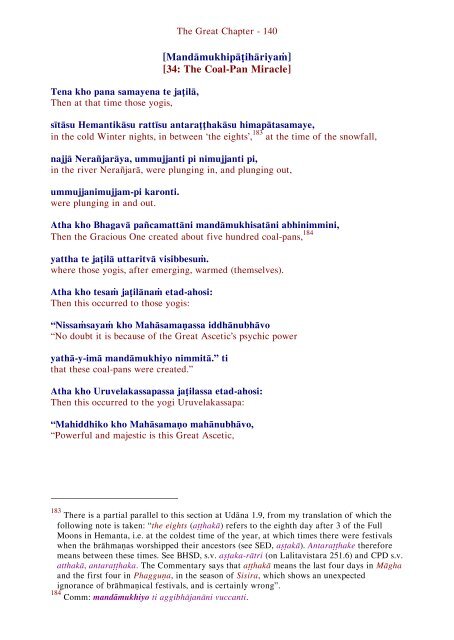Create successful ePaper yourself
Turn your PDF publications into a flip-book with our unique Google optimized e-Paper software.
Tena kho pana samayena te jaṭilā,<br />
<strong>The</strong>n at that time those yogis,<br />
<strong>The</strong> <strong>Great</strong> <strong>Chapter</strong> - 140<br />
[Mandāmukhipāṭihāriyaṁ]<br />
[34: <strong>The</strong> Coal-Pan Miracle]<br />
sītāsu Hemantikāsu rattīsu antaraṭṭhakāsu himapātasamaye,<br />
in the cold Winter nights, in between ‘the eights’, 183 at the time of the snowfall,<br />
najjā Nerañjarāya, ummujjanti pi nimujjanti pi,<br />
in the river Nerañjarā, were plunging in, and plunging out,<br />
ummujjanimujjam-pi karonti.<br />
were plunging in and out.<br />
Atha kho Bhagavā pañcamattāni mandāmukhisatāni abhinimmini,<br />
<strong>The</strong>n the Gracious One created about five hundred coal-pans, 184<br />
yattha te jaṭilā uttaritvā visibbesuṁ.<br />
where those yogis, after emerging, warmed (themselves).<br />
Atha kho tesaṁ jaṭilānaṁ etad-ahosi:<br />
<strong>The</strong>n this occurred to those yogis:<br />
“Nissaṁsayaṁ kho Mahāsamaṇassa iddhānubhāvo<br />
“No doubt it is because of the <strong>Great</strong> Ascetic’s psychic power<br />
yathā-y-imā mandāmukhiyo nimmitā.” ti<br />
that these coal-pans were created.”<br />
Atha kho Uruvelakassapassa jaṭilassa etad-ahosi:<br />
<strong>The</strong>n this occurred to the yogi Uruvelakassapa:<br />
“Mahiddhiko kho Mahāsamaṇo mahānubhāvo,<br />
“Powerful and majestic is this <strong>Great</strong> Ascetic,<br />
183 <strong>The</strong>re is a partial parallel to this section at Udāna 1.9, from my translation of which the<br />
following note is taken: “the eights (aṭṭhakā) refers to the eighth day after 3 of the Full<br />
Moons in Hemanta, i.e. at the coldest time of the year, at which times there were festivals<br />
when the brāhmaṇas worshipped their ancestors (see SED, aṣṭakā). Antaraṭṭhake therefore<br />
means between these times. See BHSD, s.v. aṣṭaka-rātri (on Lalitavistara 251.6) and CPD s.v.<br />
atthakā, antaraṭṭhaka. <strong>The</strong> Commentary says that aṭṭhakā means the last four days in Māgha<br />
and the first four in Phagguṇa, in the season of Sisira, which shows an unexpected<br />
ignorance of brāhmaṇical festivals, and is certainly wrong”.<br />
184 Comm: mandāmukhiyo ti aggibhājanāni vuccanti.


















